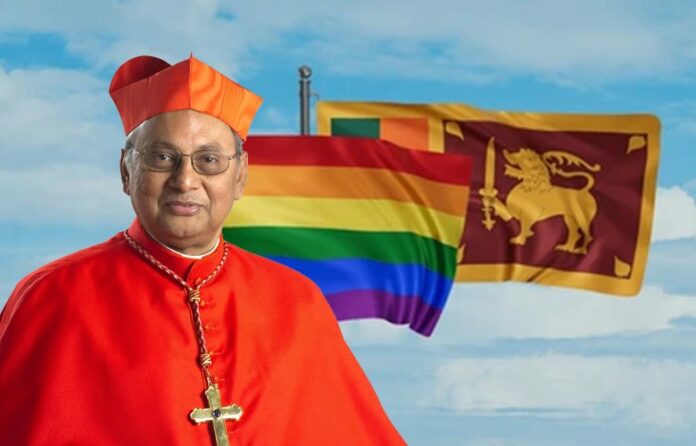By: Ovindi Vishmika
August 15, Colombo (LNW): Archbishop of Colombo, His Eminence Cardinal Malcolm Ranjith, has once again directed public attention toward sexual and gender minorities—this time alleging that foreign-funded actors are “promoting homosexuality” in Sri Lanka, enabling “gender changes for minors,” and seeking to amend marriage laws to include same-sex unions.
These claims are not only factually inaccurate and legally unsound, but they are also a troubling diversion from the profound crises Sri Lanka is already facing economic collapse, political instability, social unrest, and unresolved religious tensions, including the still-raw wounds of the 2019 Easter Sunday terrorist attacks. At a time when national leadership, moral authority, and unity are urgently required, the Cardinal’s choice to focus disproportionately on vilifying a vulnerable minority raises questions about priorities and responsibility.
Factual Misrepresentations
Two of the Cardinal’s central claims collapse under scrutiny.
First, Sri Lanka’s LGBTQ+ activists are not demanding marriage equality. Their primary legal demand is the decriminalisation of consensual same-sex relations between adults, achieved through repealing colonial-era Penal Code Sections 365 and 365A. This is not speculation,the position has been consistent for decades and was recently vindicated by the Supreme Court in Special Determination No. 13/2023, which held that decriminalisation is entirely consistent with the Constitution and does not threaten national security, public morality, or social order.
Second, minors are not eligible for legal gender change under the Gender Recognition Certificate (GRC) process. Established via Ministry of Health Circular No. 01-34/2016 and Registrar-General’s Circular No. 06/2016, the GRC process applies only to individuals aged 18 or older, following assessment by a licensed consultant psychiatrist. It does not require surgery, and it is an administrative procedure to align legal documents with gender identity—not a “programme to change children’s gender.”
By misrepresenting these facts, the Cardinal’s rhetoric fuels public misunderstanding, generates fear, and undermines informed policy debate.
Legal Inconsistencies
Article 12(1) of the Constitution guarantees that “all persons are equal before the law and are entitled to the equal protection of the law.” Article 12(2) prohibits discrimination on arbitrary grounds. While sexual orientation is not explicitly listed, Sri Lanka’s obligations under the ICCPR Act No. 56 of 2007 extend these protections to sexual and gender minorities.
The Supreme Court has made clear that consensual same-sex intimacy between adults is constitutionally protected and that speculative claims about moral decline or threats to children are “fanciful” and “palpably false.” Public statements portraying LGBTQ+ citizens as a societal danger, particularly from figures of influence, contradict this jurisprudence and risk encouraging discrimination in both public and private spheres.
A Dangerous Rhetoric in a Volatile Context
Section 3 of the ICCPR Act prohibits advocacy of hatred that constitutes incitement to discrimination, hostility, or violence. In recent months, extremist groups such as Mawwarunge Peramuna have engaged in targeted anti-LGBTQ+ campaigns, distributing defamatory material in schools and equating LGBTQ+ identities with paedophilia—conduct that potentially violates the Education Ordinance and child protection laws.
When religious leaders echo themes promoted by these groups such as framing LGBTQ+ existence as a “threat to ordinary life” it risks legitimising and amplifying extremist narratives, giving moral cover to unlawful hate campaigns.
Neglecting Sri Lanka’s Real Crises
Perhaps the most troubling aspect of the Cardinal’s remarks is their timing and focus. Sri Lanka is grappling with a convergence of urgent and deeply consequential challenges: severe economic hardship that has driven millions into poverty; political instability that has eroded public trust in governance; escalating inter-religious and communal tensions requiring measured and unifying leadership; and unresolved justice for the victims of the 2019 Easter Sunday bombings—an atrocity that lies squarely within the Cardinal’s own moral and pastoral responsibility.
Yet, instead of channelling his considerable influence toward advocating for justice for the Easter victims, alleviating poverty, or promoting reconciliation, the Cardinal has chosen to focus on vilifying LGBTQ+ citizens—a group whose existence poses no demonstrable threat to national security, public order, or the moral fabric of the country.
This is not only a misallocation of moral capital; it is a dangerous distraction. It shifts the public conversation away from systemic failures and urgent reforms and redirects it toward a fabricated moral panic. In doing so, it risks degrading public morality far more than any private, consensual relationship ever could.
Morality, Law, and Constitutional Duty
The Supreme Court’s analysis in Special Determination No. 13/2023 is unambiguous: “public morality” cannot justify criminalisation or exclusion where such measures infringe on dignity, privacy, or equality. The Court emphasised that human dignity—the foundation of all rights—requires that individuals be free to express their identity without fear of criminal sanction or public vilification.
The GRC process for adults and the move to decriminalise same-sex intimacy are both consistent with this constitutional vision. Misrepresenting them as foreign-imposed threats is not only legally baseless but socially reckless.
Law Over Prejudice
Religious leaders are entitled to their beliefs. But in a constitutional democracy, when those beliefs are expressed in ways that are factually false, legally inconsistent, and socially inflammatory, they cross a line. The law of Sri Lanka protects the rights of all citizens including LGBTQ+ persons. The Supreme Court has spoken clearly; the Constitution demands equality; the ICCPR Act prohibits incitement.
In a time of economic despair, political fragility, and religious tension, the real danger to society is not LGBTQ+ visibility,it is the legitimisation of prejudice at the expense of truth and justice. To ignore this reality is to erode both morality and the rule of law. Silence from institutions in the face of such rhetoric is not neutrality; it is complicity.
In moments of crisis, leadership demands clarity, courage, and compassion,not the amplification of fear.
